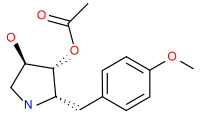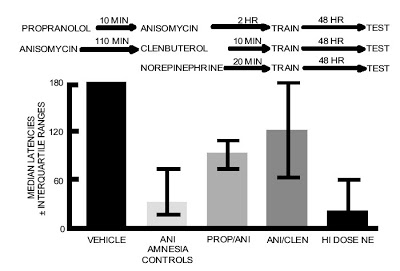Neuroscience
 In yesterday's story, EVERYTHING IS WRONG [...about protein synthesis and memory formation], The Neurocritic mentioned a potentially portentous new paper (Canal et al., 2007) that appears to question a [mostly] accepted theory that the formation of new memories requires de novo protein synthesis:
In yesterday's story, EVERYTHING IS WRONG [...about protein synthesis and memory formation], The Neurocritic mentioned a potentially portentous new paper (Canal et al., 2007) that appears to question a [mostly] accepted theory that the formation of new memories requires de novo protein synthesis:

Fig. 3 (adapted from Canal et al., 2007). Effects of intraamygdala anisomycin (ANI) (n = 4) and vehicle (n = 4) injections on release of NE [norepinephrine; DA and 5-HT shown in original figure]. Microdialysis samples were collected every 45 min beginning 135 min before and ending 8 h after injections.
Although the protein synthesis view is predominant, the authors go on to cite data inconsistent with this notion (albeit data that's been basically ignored), and describe results so off the charts, it's surprising no one has noticed these effects before:
Finally, appropriately timed administration of the beta-adrenergic antagonist propranolol and the beta-adrenergic agonist clenbuterol attenuated (but did not eliminate) the anisomycin-induced amnesia. Furthermore, a relatively high dose of norepinephrine injected into the amygdala 20 min before training produced amnesia for the inhibitory avoidance task when tested 48 hr later. No anisomycin necessary. At this stage, one can only speculate on the significance of these findings for the future of PTSD treatment.
 Fig. 5 (from Canal et al., 2007).
Fig. 5 (from Canal et al., 2007).
Reference
Canal CE, Chang Q, Gold PE. (2007). Amnesia produced by altered release of neurotransmitters after intraamygdala injections of a protein synthesis inhibitor. Proc Natl Acad Sci. 104:12500-5.
Coda
And here's something akin to Lacuna Inc., perhaps?
anisomycin.com
- A Single Gene Controls Emotional Recall!
And the neurotransmitter norepinephrine (NE), which has been in the news lately, plays a key role in the overstated headline of the day: Emotional recall is in your genes 18:00 29 July 2007 Paul Marks Image from Fig. 1A of Depue et al. (2007) Your ability...
- Neuropsychological Abstract Of The Day: Alzheimer Clinical Trial
Multicenter, Randomized, Double-Blind, Placebo-Controlled, Single-Ascending Dose Study of the Oral γ-Secretase Inhibitor BMS-708163 (Avagacestat): Tolerability Profile, Pharmacokinetic Parameters, and Pharmacodynamic Markers Clin Ther. 2012 Feb 28; Tong...
- Neuropsychology Abstract Of The Day: Memory Formation
Visualizing long-term memory formation in two neurons of the Drosophila brain Science. 2012 Feb 10;335(6069):678-85 Chen CC, Wu JK, Lin HW, Pai TP, Fu TF, Wu CL, Tully T, Chiang AS Abstract Long-term memory (LTM) depends on the synthesis of new proteins....
- Insulin-like Growth Factor (igf-ii) And Memory Functioning
A press release from the National Institutes of Health: Little-known growth factor enhances memory, prevents forgetting in rats Works only if given during windows of memory malleability NIH News Wednesday, January 26, 2011 Read the full press release...
- Synapse-associated Protein 97 (sap97): Pdz1
From a Brown University press release (the press release includes a graphic showing a portion of the protein):Researchers Reveal Secret of Key Protein in Brain and Heart Function 29 July 2005 Brown University researchers have solved the structure of a...
Neuroscience
ANISOMYCIN IS STRONG
 In yesterday's story, EVERYTHING IS WRONG [...about protein synthesis and memory formation], The Neurocritic mentioned a potentially portentous new paper (Canal et al., 2007) that appears to question a [mostly] accepted theory that the formation of new memories requires de novo protein synthesis:
In yesterday's story, EVERYTHING IS WRONG [...about protein synthesis and memory formation], The Neurocritic mentioned a potentially portentous new paper (Canal et al., 2007) that appears to question a [mostly] accepted theory that the formation of new memories requires de novo protein synthesis:...the presumption is that protein synthesis inhibitors interfere with the establishment of enduring neural changes (i.e., those fundamental to memory, drug relapse, epilepsy, or motor cortex organization) by blocking mechanisms of neuronal and synaptic change that require de novo protein synthesis. Thus, evidence obtained with protein synthesis inhibitors has a pervasive influence on theories related to the fundamental mechanisms of not only memory formation but also a wide range of brain functions.

Fig. 3 (adapted from Canal et al., 2007). Effects of intraamygdala anisomycin (ANI) (n = 4) and vehicle (n = 4) injections on release of NE [norepinephrine; DA and 5-HT shown in original figure]. Microdialysis samples were collected every 45 min beginning 135 min before and ending 8 h after injections.
Although the protein synthesis view is predominant, the authors go on to cite data inconsistent with this notion (albeit data that's been basically ignored), and describe results so off the charts, it's surprising no one has noticed these effects before:
The findings described in the present article indicate that intraamygdala anisomycin injections result initially in extraordinarily large increases in release of biogenic amines near the site of injection, followed later by extensive and prolonged decreases in release of the amines. Additionally, blockade of amygdala beta-adrenergic receptors at the time of anisomycin injections, i.e., at the time of high release of biogenic amines, attenuates the amnesia produced by anisomycin as tested 48 h after training. Similarly, activation of beta2-adrenergic receptors during the time of amine depletion also attenuates anisomycin-induced amnesia assessed at 48 h after training. Moreover, a high dose of NE injected into the amygdala before training impairs memory to an extent similar to that seen after anisomycin injections. Together, these findings suggest that intraamygdala injections of anisomycin interfere with memory formation by inducing extraordinary changes in the release profiles of NE, DA, and 5-HT.A critique of the microdialysis methods used in this study is beyond the scope of this blog, but any expert commentary is welcome.
Finally, appropriately timed administration of the beta-adrenergic antagonist propranolol and the beta-adrenergic agonist clenbuterol attenuated (but did not eliminate) the anisomycin-induced amnesia. Furthermore, a relatively high dose of norepinephrine injected into the amygdala 20 min before training produced amnesia for the inhibitory avoidance task when tested 48 hr later. No anisomycin necessary. At this stage, one can only speculate on the significance of these findings for the future of PTSD treatment.
 Fig. 5 (from Canal et al., 2007).
Fig. 5 (from Canal et al., 2007). Reference
Canal CE, Chang Q, Gold PE. (2007). Amnesia produced by altered release of neurotransmitters after intraamygdala injections of a protein synthesis inhibitor. Proc Natl Acad Sci. 104:12500-5.
Coda
And here's something akin to Lacuna Inc., perhaps?
* * *
anisomycin.com
"getting rid of bad memories"
The coundown has begun...
e-mail
[email protected]
- A Single Gene Controls Emotional Recall!
And the neurotransmitter norepinephrine (NE), which has been in the news lately, plays a key role in the overstated headline of the day: Emotional recall is in your genes 18:00 29 July 2007 Paul Marks Image from Fig. 1A of Depue et al. (2007) Your ability...
- Neuropsychological Abstract Of The Day: Alzheimer Clinical Trial
Multicenter, Randomized, Double-Blind, Placebo-Controlled, Single-Ascending Dose Study of the Oral γ-Secretase Inhibitor BMS-708163 (Avagacestat): Tolerability Profile, Pharmacokinetic Parameters, and Pharmacodynamic Markers Clin Ther. 2012 Feb 28; Tong...
- Neuropsychology Abstract Of The Day: Memory Formation
Visualizing long-term memory formation in two neurons of the Drosophila brain Science. 2012 Feb 10;335(6069):678-85 Chen CC, Wu JK, Lin HW, Pai TP, Fu TF, Wu CL, Tully T, Chiang AS Abstract Long-term memory (LTM) depends on the synthesis of new proteins....
- Insulin-like Growth Factor (igf-ii) And Memory Functioning
A press release from the National Institutes of Health: Little-known growth factor enhances memory, prevents forgetting in rats Works only if given during windows of memory malleability NIH News Wednesday, January 26, 2011 Read the full press release...
- Synapse-associated Protein 97 (sap97): Pdz1
From a Brown University press release (the press release includes a graphic showing a portion of the protein):Researchers Reveal Secret of Key Protein in Brain and Heart Function 29 July 2005 Brown University researchers have solved the structure of a...
